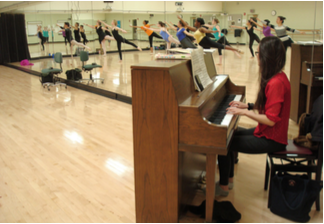Born in Singapore, Pallas Catenella ’17 has also lived in Indonesia, Jordan, Hungary, Russia, Egypt and is currently based in Italy. It is her extensive travel experience, she says, that greatly contributed to her fascination with music and culminated in her interest in classical music and the piano, the instrument she studies today.
Although Catenella began playing piano when she was five, her passion for the instrument did not emerge until she worked with a particularly influential teacher while living in Budapest. It was also during her residence in Hungary that she began to appreciate classical music to a greater extent.
“I spent the longest time in Hungary, and all the folk songs there and the tradition of including classical music in everyday life have influenced me a lot,” she said. “I find myself gravitating towards those types of pieces because they seem most familiar to me.”
Currently a music and English double major at Wellesley, Catenella has continued her passion for classical music and piano by serving as an accompanist for the physical education ballet classes. Catherine Ulissey, the instructor who teaches these ballet classes, explained how the position of a piano accompanist was created.
“Previously filled by professionals, this [new student job] was created just for [Catenella] by PERA (Physical Education, Recreation Athletics), and she has performed impressively in it, proving herself reliable, dependable and incredibly capable of the demanding work,” she said. “It has always been a difficult matter getting competent musicians and accompanists to come all the way out to the campus to play evening classes, which is when the ballet classes meet. The position works well for Pallas, though, giving her a chance to earn some money doing what she loves and desires as a career.” Catenella also received an award for her work as Best Student Employee in PERA.
According to Catenella, one of the most rewarding aspects of being a piano accompanist for the ballet classes is experiencing the fusion of multiple musical art forms at once.
“When you play classical music, whether it’s a waltz or a mazurka, you have to visualize dancing in your head. But in ballet classes, they’re literally dancing right in front of you. So I find it very enjoyable to have that collaboration where music is becoming a visual art,” she said.
Though she enjoys being a piano accompanist, Catenella also admitted that with this position come several challenges. “It took a while to adjust to the fact that my music was directly affecting people around me,” she said. “I’ve never had to think so much about slight variations in tempo, rubato or improvising and filling out harmonies so [the dancers] don’t get bored. It’s been a growing experience for me, to be able to make adjustments.”
Catenella also added that being an accompanist requires a growing skill-set, including both technical, music-related skills as well as soft skills, such as discipline and practice. One of such soft skills, she explained, includes multi-tasking, as the accompanist must be able to keep up with her own music as well as the dancers.
“Being able to focus on= two different things at once is definitely a challenge. At the beginning, I would sometimes get distracted easily because I would be watching the dancers to try to match up, and then I would lose my place and that would result in disaster,” she said, with a laugh.
Regarding her post-graduation plans, Catenella expressed interest in pursuing either a PhD in musicology or a Doctor of Musical Arts (DMA) degree in music performance. Catenella acknowledged Wellesley’s music department as having been instrumental in supporting her ambitions to pursue music accompaniment.
“Because [the department] is so small, you get to have really close relationships with all of the professors. All of the professors are really willing to support you and help you achieve what you really want to achieve in music,” she said, adding, “Because it’s small, it [also] has a lot of performance opportunities, and you have an opportunity to play in them.”
Catenella explained that what attracts her most to performing and studying music is its ability to communicate with any listener, despite their cultural background.
“Besides the fact that I find music very fun to play, I think I really appreciate the manner in which music allows the listener to experience the ineffable,” Catenella said. “It has a very remarkable unifying factor — I think music can speak to anyone and everyone in any way. That’s something I really appreciate when I have traveled so much.”





Roger Middleton | Aug 10, 2017 at 11:30 pm
My niece’s wedding is coming up and they had mentioned that there would be a piano accompanist playing through the entire wedding and I had never even heard of one of that profession. I really appreciated that Catenella had mentioned that it is not an easy thing to do because it requires an immense focus, especially to make sure the current pace is fitting for the environment they’re playing. I can’t wait to see how great to an accompanist in action, I’m sure it will be fascinating.